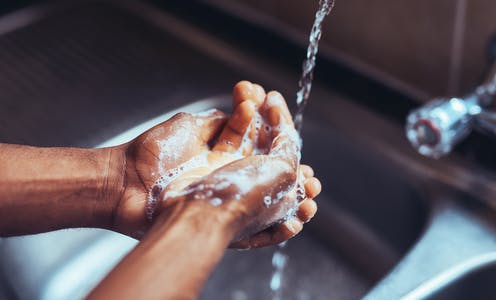The covid-19 pandemic has made us aware of the importance of hygiene especially hand hygiene. Washing our hands regularly for the right amount of time has been taken seriously in the recent few months and most people are following it religiously.
Washing hands is not only crucial to avoid COVID infection, it can also help in avoiding many more other infections which can affect our health. It is true that a simple handwash with running water and soap can help in keeping many of the infections at bay.
The germs which are present on different objects and surfaces can spread various infections when we touch our face, eyes, nose without washing hands. Especially during this COVID time, when the virus can stay on the door knobs, lift buttons, delivery packages for long hours and the chances of spreading the infection is higher if we touch our face without washing or sanitizing our hands. Handwashing is one of the major protocols to avoid COVID 19 infection along with social distancing and wearing mask.
Also, gastrointestinal infections, such as Salmonella, and other respiratory infections are common infections which can spread through fomites.
When should you wash or sanitize your hands?
• After blowing your nose or after sneezing in your hands.
• After touching the door knob and handle, lift buttons
• After using car, staircase railings, metro, public transport
• After touching vegetables, packages from outside
• While removing mask/wearing mask
• Before and after eating or while touching the food
• After touching food like raw meat, poultry products or fish
• After handling garbage or contact with contaminated surfaces such as garbage bins, cleaning-cloth.
• After wiping another person’s nose, or handling soiled tissues.
• Before preparing or taking medications.
• When looking after another person who is sick, including close contact with blood or body fluids such as vomit or saliva.
• While treating a cut or wound.
• While using contact lenses.
• Handling pets, animals or animal waste.
• After handling pet food or pet treats.
• After using the washroom (changing diapers, sanitary pads or assisting a person when using the toilet).
This pandemic has brought back the focus to maintain personal hygiene like washing hands soon after coming home or receiving any packages from others.
Listed below are the few commonly occurring infection when you ignore to wash your hands:
COVID 19 – As all of us are aware, one of the important reasons behind the spread of Coronavirus is ignorance of hand hygiene.
Noroviruses – Norovirus is the most common cause of viral gastroenteritis and it can affect people of all age groups. It is transmitted due to poor hand hygiene after using washrooms and it then spreads to healthy individuals.
Respiratory illness – Respiratory illnesses are usually spread via droplets and when a person touches the droplets and forgets to wash his hands, he can also develop the infection. Common respiratory illnesses caused by poor hand hygiene include the common cold, influenza, chicken pox and meningitis.
Hepatitis A – Hepatitis A is a viral infection which can cause severe symptoms including problems with the liver, jaundice, abdominal pain, fever and fatigue. it spreads through feco – oral route which is again due to poor hand hygiene.
The right way to wash your hands to avoid any infections –
• Remove rings and watches before you wash your hands
• Wet your hands with clean, running water
• Apply soap and scrub well for 20 seconds (or longer if the dirt sticks on).
• Rub hands together rapidly across all surfaces of your hands and wrists.
• Wash the back of your hands, your wrists, between your fingers and under your fingernails.
• Rinse well under running water and make sure all traces of soap are removed.
• Dry your hands using a clean towel or air dry them
Personal hygiene is an important aspect to stay healthy. Visit your doctor if you develop any infection.
Credit: Dr. Shruti Arya, Consultant – Internal medicine, Columbia Asia Hospital Whitefield















































